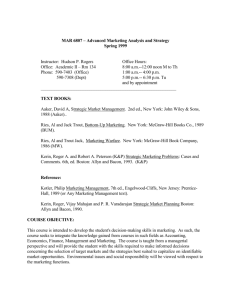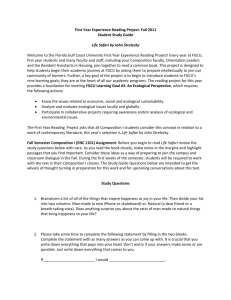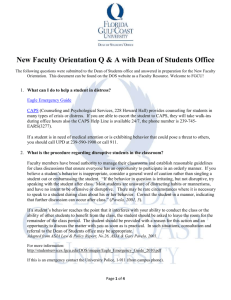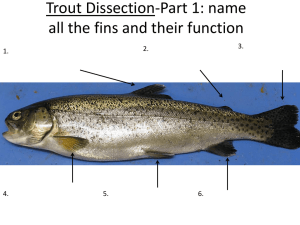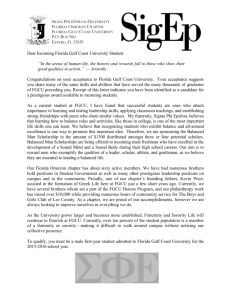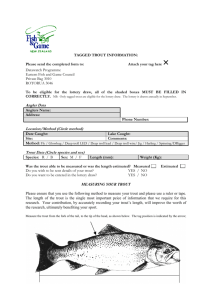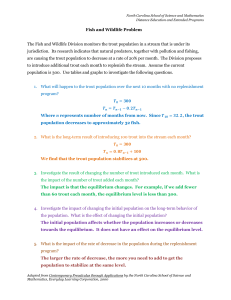MAR 6807 – Advanced Marketing Analysis and Strategy
advertisement
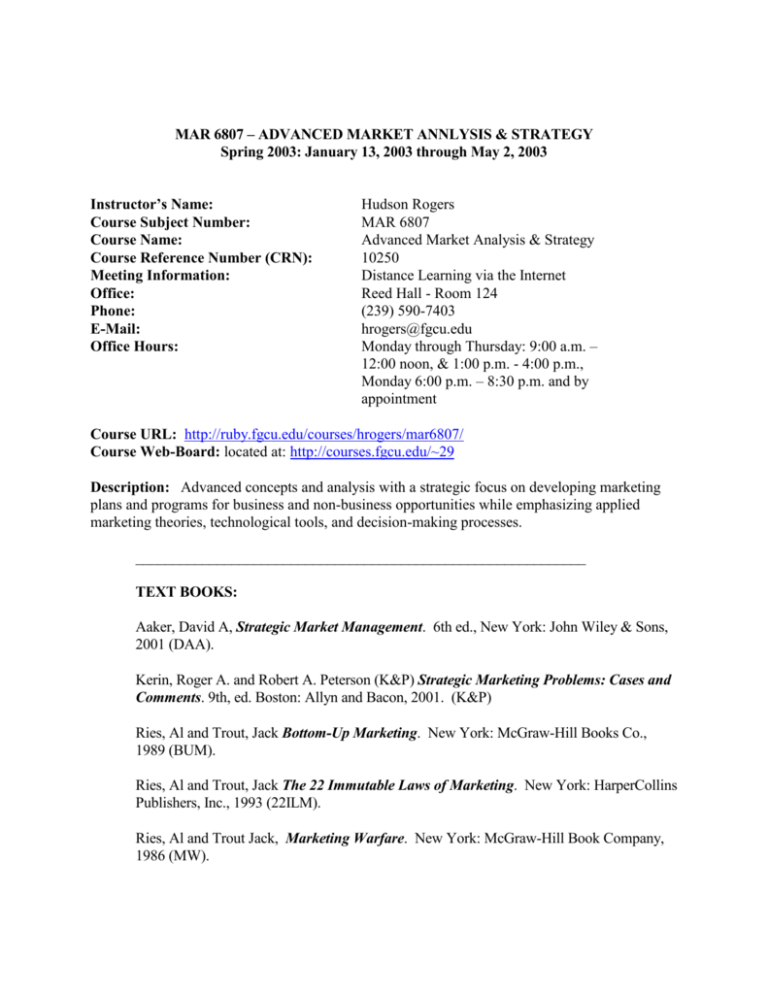
MAR 6807 – ADVANCED MARKET ANNLYSIS & STRATEGY Spring 2003: January 13, 2003 through May 2, 2003 Instructor’s Name: Course Subject Number: Course Name: Course Reference Number (CRN): Meeting Information: Office: Phone: E-Mail: Office Hours: Hudson Rogers MAR 6807 Advanced Market Analysis & Strategy 10250 Distance Learning via the Internet Reed Hall - Room 124 (239) 590-7403 hrogers@fgcu.edu Monday through Thursday: 9:00 a.m. – 12:00 noon, & 1:00 p.m. - 4:00 p.m., Monday 6:00 p.m. – 8:30 p.m. and by appointment Course URL: http://ruby.fgcu.edu/courses/hrogers/mar6807/ Course Web-Board: located at: http://courses.fgcu.edu/~29 Description: Advanced concepts and analysis with a strategic focus on developing marketing plans and programs for business and non-business opportunities while emphasizing applied marketing theories, technological tools, and decision-making processes. _____________________________________________________________ TEXT BOOKS: Aaker, David A, Strategic Market Management. 6th ed., New York: John Wiley & Sons, 2001 (DAA). Kerin, Roger A. and Robert A. Peterson (K&P) Strategic Marketing Problems: Cases and Comments. 9th, ed. Boston: Allyn and Bacon, 2001. (K&P) Ries, Al and Trout, Jack Bottom-Up Marketing. New York: McGraw-Hill Books Co., 1989 (BUM). Ries, Al and Trout, Jack The 22 Immutable Laws of Marketing. New York: HarperCollins Publishers, Inc., 1993 (22ILM). Ries, Al and Trout Jack, Marketing Warfare. New York: McGraw-Hill Book Company, 1986 (MW). Reference Books: Kotler, Philip Marketing Management, 7th ed., Engelwood-Cliffs, New Jersey: PrenticeHall, 1989 (or Any Marketing Management text). Kerin, Roger, Vijay Mahajan and P. R. Varadarajan Strategic Market Planning. Boston: Allyn and Bacon, 1990. Ries, Al and Ries, Laura, The 22 Immutable Laws of Branding. New York: HarperCollins Publishers, Inc., 2002. Ries, Al and Trout, Jack Positioning: The Battle for Your Mind. Warner Books, Inc., 1981. Hartley, Robert F. Marketing Mistakes. Wiley and Sons, 1998 COURSE OBJECTIVE: This course is intended to develop the students’ understanding of and skill and experience in formulating and planning marketing strategies. As such, the focus of the course is strategic. The course seeks to integrate the knowledge gained from courses in such fields as Accounting, Economics, Finance, Management and Marketing in the design of marketing strategies for various stages of the product life cycle, including strategies for entry, growth, and defending a brand's position. The course is taught from a managerial perspective and will provide the student with the skills required to make informed decisions concerning the selection of target markets and the strategies best suited to capitalize on identifiable market opportunities. Environmental issues and ethics and social responsibility will be viewed with respect to the marketing functions. While tactical elements play an important role in marketing they will receive much less attention, as the focus will be on strategic intent. The course material consists of a mix of readings, online lectures notes, and cases. The readings summarize the theory of strategic marketing, drawing heavily on research in marketing and relevant work in management science and economics. Topics include competitive analysis and decision-making, industry analysis, and models of competition and strategy. Cases follow the readings and lecture section of the course. In addition to giving students actual experience in formulating competitive strategies, the cases are selected to illustrate both marketing theory and its application. The major objective of the cases is to provide students with the opportunity to discuss emerging issues in marketing as they influence marketing strategy. It time permits, a computer simulation game will be used to further illustrate marketing theory and its application. COURSE REQUIREMENTS: You are responsible for all the material in the text and on the syllabus. 2 You are responsible for all readings and/or writing assignments. You are responsible for class participation, as this is not a lecture/discussion course. You are responsible for presenting assignments on time. You are responsible for all work posted on the class Web Board regardless of whether it is on the syllabus or not. DISTANCE LEARNING STRATEGY: This Internet version of Advanced Market Analysis and Strategy is designed to provide students with the opportunity to take the course at their own pace and in any location they choose. However, a schedule is provided for those students who prefer more structure and the opportunity to use the Web Board to “discuss” Market Analysis and Strategy related issues and applications “at a distance.” As a guide, the class schedule includes “not later than” due dates for the readings, assignments, and examinations. Weekly real-time Chat Sessions (in WebCT) will begin on Monday January 13, 2003. Each session will last a maximum of 75 minutes. Weekly chat sessions will be held at 9:30 p.m. on Monday. With a class of over 45 students, it is impossible to select a time that is ideal for every student. The first chat session will start (in Web CT) at 8:30 p.m. on Monday January 13, 2003. To get to the chat session: 1. Self-Register and then log in to WebCT. 2. Go to the course “MAR 6807 Advanced Market Analysis and Strategy.” 3. Click on the “Chat” icon. 4. Click on Room #1 Attendance at these chat sessions are advisable but they are VOLUNTARY. Following the session, the log of each chat session will be posted to the class Web Board for your review. The sessions will be similar to group discussion sessions or on-campus office hours for groups of students. While the chat sessions are voluntary, you are responsible for reading the Chat Session Logs that will be posted on the Web Board. In some cases, the logs may be the sole means of communicating some ideas and addressing issues raised during the chat sessions. Therefore, even if you did not attend a chat session, you are responsible for reading the log to keep abreast of on-going discussions and or class development (changes). Prior to the start of the semester, you should VISIT the course URL, read WELCOME to MAR 6807 – Advanced Market Analysis & Strategy. This will tell you about the course, learning objectives, course overview, assignments, examinations, schedules, and grades. You should also print and review a copy of the course syllabus. After reading this material, please CLICK on the weekly links to find the assignments, and access the Web Board. Use your FGCU User ID and password to gain access to the Web Board. Once on the Web Board, RESPOND to the Web Board Roll Call. The Web Board Roll Call requests your e-mail contact information for communication during the course. 3 You also need to SELF REGISTER for WebCT. Once registered in WebCT, you can sign-in to get involved in the weekly chat sessions. To self-register, click on the WebCT icon located on the weekly schedule. Please e-mail (hrogers@fgcu.edu) or telephone me (239-590-7403) if you have problems logging on to the Web Board or to WebCT. TEACHING METHOD: This is an INTERNET COURSE. This means that the course will be offered wholly on the Internet. As such, an independent study format will generally be used. The text, reading and other online materials will be broken up into modules. Accordingly, each week’s materials will be presented in one or more modules. (Please review the browser information on the web site. You may also want to test your online skills by working through the online tutorial provided). This is an intensive course and you must keep up if you are to complete the course during the semester. The course is divided into two sections. The first section of the course will cover readings designed to prepare you to effectively analyze marketing cases (6 weeks). Therefore, I advise that you read early and read a lot so that you will have the tools required to address the assigned cases that will come later. The second half of the course will focus on a number of cases analyses. The first two cases will be done individually. For the other cases, students will be divided into groups and required to prepare in-depth case analyses. Since this is an Internet course, you may want to use a communication program such as WebCT Chat or AOL's Instant Messenger, and e-mail to facilitate your virtual group meetings. If time permits, a marketing simulation game may be introduced to enable students to make a number of marketing decisions while competing against other members of the class. For most of you, this is the final marketing course that will you will take in the MBA program. Accordingly, the course is designed to provide you with the skills required to manage the marketing aspect of a business. Therefore, you are expected to make marketing decisions from the perspective of the decision-maker. Each week the instructor will address any problems that you may have experienced with the material. A discussion of the issues and subject matter will be prompted by but not confined to the questions and issues assigned for the class or by student questions. Student questions, comments, and or observations should be posted on the class Web Board and will form one aspect of the participation element of the classroom experience. Web Board discussions will be prompted by but not confined to the material and thoughts 4 contained within specific assignments or assigned readings. Each student is required to actively participate in the Web Board aspect of the class experience. It is important that your Web Board participation be reflective of the materials from the modules, the assigned textbook chapters and outside readings. In graduate classes, most learning should occur outside the classroom. The Web Board sessions should be regarded as an opportunity to put the pieces of your "marketing knowledge” together in a meaningful and coherent manner. Feel free to bring discussion points, cloudy issues, or answers to the attention of the class by posting those issues on the Web Board. Case analyses and reports make-up the primary assignments in this course. A series of case problems will be utilized to enable students to grasp and develop the skills required for marketing decision-making. Students will be required to prepare written reports on the assigned cases. Students are also required to fully participate in Web Board discussions. Students will prepare a WRITTEN presentation of a number of cases. The written case report should be typed and double-spaced. Such reports should reflect careful analysis, logical synthesis, and attention to every element of the assignment. The case summary (along with applicable quantitative analysis) is to be turned in via e-mail by the due date. During the class chat sessions, students will be called upon to present their ideas or to comment on specific points. The participation grade will be derived from the quality of a student's response to these inquiries as well as general participation in chat room OR Web Board discussions. Response to Student Communication and Assignments As a policy, I will attempt to respond to your communication and questions within 72 hours. Therefore, it is important that you plan your work so that you can obtain your responses in a timely manner. In every instance I will attempt to return assignments within one week. However, given the relative size of the class, it may take as long as two weeks for me to grade your assignments. Learning Objectives By the end of the semester students will be able to: Differentiate between and discuss the elements of marketing. Identify and discuss the elements of the environment and their relationship to the practice of marketing. Conduct opportunity analysis (market segmentation) and target marketing. Differentiate between the concepts of mass marketing, segmentation, target marketing, differentiation and positioning. Identify and develop marketing segmentation strategies Evaluate and manage the marketing research process Assess the financial aspects of marketing decisions Develop and manage the integrated market communications strategy Develop comprehensive marketing programs 5 Discuss the strategies open to firms for operating in competitive environments Identify and discuss the elements and models that are useful to the process of developing effective market strategy Conduct the strategic analysis needed for developing market strategy Identify and discuss some of the alternative business strategies that are effective in the development of market strategies. EXAMINATIONS AND GRADING: One (mid-term) examination would be given in this course. This exam will cover the readings and discussions addressed in the first section of the course. The majority of your grades are assigned for class participation, and written case reports. The written exam will be designed to check knowledge of specific concepts as well as comprehensive understanding of principles and interrelationships. Essay questions, and ALL written reports, will be graded on the basis of how logically supported the response is to the question. You must be prepared to integrate material from the text and lecture into the development of your answer. Grade distribution is as follows: Cases (4 @ 100 points each) Midterm Exam Final Exam – Comprehensive Case Analysis Class Participation Total 400 points 100 points 100 points 20 points 620 points Grade distribution is as follows: A = 94% to 100% A- = 90% to 93% B+ = 87% to 89% B = 84% to 86% B- = 80% to 83% C+ = 77% to 79% C = 74% to 76% F = Below 74% At the end of the semester, your assigned grade for the course will be available via Gulfline at: http://gulfline.fgcu.edu The grade of “Incomplete” will be given by exception only, in accordance with University policy, and there is no extra credit in this course. 6 MAKE-UP POLICY: Assignments are late if they are not e-mailed by the due date and time. Absolutely no case assignments will be accepted late. No make-up examinations or quizzes will be given unless prior approval is obtained from the professor. I do not like to give make-up examinations simply because I prefer grading all examination scripts at the same time. This allows for consistency in grading across the class. If it is absolutely necessary to be absent, you must make arrangements beforehand to merit a rescheduled test. The course is designed for you to complete the work over time. It is anticipated that no grade of “incomplete” may be assigned for this course. Therefore, it is imperative that you keep pace with the assignments. ACADEMIC DISHONESTY: “All students are expected to demonstrate honesty in their academic pursuits.” The University Policy on Academic Honesty will be adhered to in this class. For further information on your responsibilities as students, and the consequences for violating the policies see the FGCU Student Guidebook – 1999-2000 (pp. 19-80). STUDENT DISABILITY SERVICES: “Disability Services promotes opportunities for full participation in university academic programs, activities, and services by students with disabilities, through the provision of reasonable accommodations, other support services and training….” (FGCU Catalog 20022003, p. 21). If you need to request accommodation in this class due to disability, or you suspect that your academic performance is affected by a disability, please let me know or contact the Office of Student Disability Services is located in the Student Services Building, McTarnaghan Hall Room. The phone number is (239) 590-7956 (for more detail see page 21 of the FGCU 2002-2003 Catalog). INFORMATION AND E-MAIL AT FGCU From time to time, I will send e-mails to you at your class FGCU e-mail account. Therefore, it is important that you activate your FGCU e-mail account. You can forward your e-mail to your home e-mail account by visiting http://mercury.fgcu.edu/studentaccts. Please note that it is your responsibility to activate your FGCU e-mail account (and activate the forward function as needed), as I will not be able to personally e-mail each student when I wish to make general announcements. I will also place general announcements on the Web Board (as a back up to the e-mail). Please read the following: 7 Dear Students: The Office of Student Information Systems welcomes you (or welcomes you back) to FGCU. Although you received this information at orientation, we thought we might remind you about some of the services we provide and hope you will use frequently. Important Note: In order to use the services listed below, you must first activate your account. To activate your account you will need your PIN number. This is the same PIN number used to access the Gulfline Student Information System. To activate your account, visit our web site at http://mercury.fgcu.edu/StudentAccts/activate.asp and follow the instructions. If you do not know or have forgotten your PIN you will need to obtain it from the Office of the Registrar or look it up online at: http://eagle.fgcu.edu/. Visit the Office of the Registrar on the first floor of the Student Services building, call them at (941) 590-7878, or email them at ORR@fgcu.edu to obtain your PIN. Students who request PIN numbers by phone or e-mail will have their PIN number mailed to their address of record because PIN numbers are not given out over the telephone or over email. Each student has a computer account. This account is used to log on to the FGCU network in the computer labs and in the university residence halls. It is also used to access most library resources such as course reserves and online databases. This is also the account you will use to connect to your student e-mail account and the student web server to store web pages you create. Each student has an electronic mail account on the eagle.fgcu.edu server. You may access your email via the world-wide-web at: http://eagle.fgcu.edu/cgi-bin/openwebmail/openwebmail.pl . If you prefer, you can also choose to use any POP3 or IMAP4 electronic mail client to access your email. Students who choose to use another email account should forward their university email using the account activation system: http://eagle.fgcu.edu/cgi-bin/openwebmail/openwebmail.pl. FAQ on student a-mail can be accessed through; http://mercury.fgcu.edu/StudentAccts/faq.asp. Each student has space available to store world-wide-web pages on the student.fgcu.edu server. You may move files to your web space via Microsoft FrontPage, FTP, or, when you are on campus and logged into the FGCU network, by using a shared folder. A "getting started" guide and policies can be found at http://student.fgcu.edu Each class has an automatic distribution list available. An email distribution list is provided for each CRN giving students and faculty an easy way to send electronic mail to all students registered for a particular course. For example, if you want to send an email to all students enrolled in course reference number 85555, simply send the mail to crn85555@eagle.fgcu.edu. Faculty email addresses are not automatically included on these lists. Faculty members who would like to be included on the distribution lists for their classes are asked to send a list of the CRN's they are teaching to postmaster@eagle.fgcu.edu. 8 Please let us know if we can be of service to you. We are available to help you have a productive and rewarding year! Office of Student Information Systems, sis@eagle.fgcu.edu (239) 590-7961 ATTENDANCE: This course will be provided strictly on the Internet. You will be held accountable for all policies and regulations described in the current university catalog. Additionally, you will be responsible for reading all the material posted on the Web Board as (in addition to Chat Sessions and e-mail) this will be the major form of class room communication. NOTE: This syllabus is not to be considered as a contract. It is merely a guide to assist the student in planning and preparing for class. With reasonable notice, this syllabus is subject to change. Changes will be posted on the Web Board or may be discussed during our weekly Chat Sessions. In all cases, the log of the Chat Sessions will be posted on the Web Board. While the Chat Sessions are Voluntary, you are responsible for reading the log of the chat sessions. All written assignments are to be typed (double spaced) and submitted by the date indicated on the course outline. Assignments are to be turned in by the dates shown The use of industry related and other reference related material is expected. The FGCU Library provides a wealth of such information. Your discussion should reflect that you made extensive use of reference materials. 9 Course Outline MAR 6807 – Advance Marketing Analysis and Strategy Week #1 – 1/13/2003 Assignment: 1. Visit the FGCU Distance Learning Web page (URL: http://itech.fgcu.edu/distance/) review the Frequently Asked Questions and the Technology Requirements. 2. Take the Technology Skills Self-Assessment Survey (found on the Distance Learning Web page) 3. Visit the Tech Skills Web Page and click on Web Skills (http://www.fgcu.edu/support/techskills.html). From here visit the section on Web Board and go through this tutorial if you have never used a Web Board prior to taking this class. This is important since the Web Board is the means by which we will communicate. You may also want to take the opportunity to run through some of the other on line tutorials on this site. 4. Web Board Roll Call: Visit the course Web-board (http://courses.fgcu.edu/~29) and post your name and e-mail contact information. You should also post a “short” biography about yourself. At a minimum, your biography should include name, gender, city in which you live (no mailing addresses please), when you hope to graduate, expected date of graduation, area of concentration if any, and any other information you wish to share. You could also indicate what you hope to get out of the course. No personal information please! On the class Web-Board (http://courses.fgcu.edu/~29) post one discussion question concerning the material covered in Module 1.1 - Introduction to Advanced Market Analysis & Strategy Glossary Aaker – David A. Aaker, Strategic Market Management. MWF – Marketing Warfare, Reis and Trout K&P – Kerin and Peterson, Strategic Marketing Problems BUM – Bottom Up Marketing, Ries and Trout 22ILM – 22 Immutable Laws of Marketing, Ries and Trout Week #1 – 1/13/2003 Learning Objectives By the end of the week students will be able to: Discuss the notion of Business Strategy. Identify the elements that must be determined in establishing a business strategy Identify and discuss the strategic trusts that must be considered when establishing a business strategy. Provide an overview and identify the elements of the external and internal analysis that provide the input to strategy development. 10 Know what is involved in strategy identification and selection. Discuss the nature of marketing in a competitive environment Discuss “Marketing as War.” Assignment for Week #1: Introduction to Advanced Market Analysis & Strategy Chap. 1 - Business Strategy: The Concepts and Trends in its Management (Aaker) Chap. 2 - Strategic Market Management: An Overview (Aaker) Introduction: Marketing is War (MWF) Week #2 – 1/20/2003 Martin Luther King Holiday (1/20/2003) Learning Objectives By the end of the week students will be able to: Identify and discuss the factors external to the business that can affect Business Strategy including segmentation, customer motivation analysis, and the identification of unmet needs. Discuss the process for identifying and the dimensions for conducting a competitive analysis. Identify and discuss the elements involved in conducting a market analysis. Identify opportunities, threats, and strategic uncertainties as a result of conducting a market analysis. Discuss the “elements of war” as it relates to marketing. Discuss the “Principle of Force” as it relates to marketing. Assignment for Week #2: Chap. 3-5 (Aaker) Chap. 1: 2 - 2500 of War (MW F- Ries and Trout) Chap. 2: The Principle of Force (MWF – Ries and Trout) Week #3 – 1/27/2003 Learning Objectives By the end of the week students will be able to: Identify and discuss the dimensions that comprise the environment within which the firm operates. Know how to conduct an environmental analysis and to identify opportunities or threats to an organization. Discuss the options open to firms for dealing with strategic uncertainty. Identify the elements involved in conducting a firm’s internal analysis. Discuss the determinants of strategic options and the characteristics of a business that make them feasible. 11 Identification of the organization’s strengths and weaknesses based upon its assets and competencies as a result of conducting an internal analysis. Conduct a business portfolio analysis along two key dimensions: attractiveness of the market, and strength of the firm’s position in that market. Identify and discuss the concept and creation of a Sustainable Competitive Advantage as a precursor to strategic alternatives that the firm should consider. Expand the discussion of “Marketing as War.” Assignment for Week #3: Chap. 6-8 (Aaker) Chap. 3-6 (MWF - Ries & Trout) Week #4 - 2/3/2003 Learning Objectives By the end of the week students will be able to: Identify and discuss the differentiation strategies open to a firm. Identify and discuss low cost (value), focus, and the preemptive move as additional routes to building a Sustainable Competitive Advantage (SCA). Identify and discuss the elements involved in selecting and building the firm’s strategic position. Discuss the notion of marketing as “Offensive” and “Defensive” Warfare. Assignment for Week #4: Chap. 9-11 (Aaker) Chap. 7-8 (MWF - Ries & Trout) Week #5 - 2/10/2003 Learning Objectives By the end of the week students will be able to: Identify and discuss growth strategies (penetration, market development, product-market expansion, diversification, vertical integration, and the big idea) open to the firm. Discuss strategies involved in “flanking” and “guerilla” warfare in the marketing realm. Assignment for Week #5: Chap. 12 - 14 (Aaker) Chap. 9-10 (MWF – Ries & Trout) 12 Week #6 - 2/17/2003 Learning Objectives By the end of the week students will be able to: Identify and discuss strategies best suited to declining and hostile markets. Identify and discuss the elements of global strategies as distinct from domestic or multinational strategies. Discuss strategy versus tactics in the marketing realm. Assignment for Week #6: Chap. 15 & 16 (Aaker) Chap. 15 & 16 (MWF – Ries & Trout) Week #7 - 2/24/2003 Mid-Term Exam (Material from Strategic Market Management – Aaker), Due by 3/2/03 Reading for the Week #7: Foundations of Strategic Marketing Management (K&P - Ch. 1) Chap. 1 & 2 (BUM - Ries and Trout) Chap. 11-14 (MWF – Reis and Trout) Week #8 – 3/3/2003 Learning Objectives By the end of the week students will be able to: Identify and discuss the financial aspects of marketing management including variable and fixed costs, sunk costs, margins, contribution analysis, liquidity, operating leverage, and discounted cash flow. Identify and discuss the marketing decision making process. Identify and discuss the steps in the case analysis process. Conduct a case analysis. Discuss Marketing strategy in selected industries: cola, beer, burger, and computer. Identify and discuss the elements involved in conducting an opportunity analysis. Conduct an opportunity analysis Identify and Discuss the Ethical implications of marketing decisions. Assignment for Week #8: Financial Aspects of Marketing Management (K&P - Ch. 2) Marketing Decision Making and Case Analysis (K&P – Ch. 3, and pp. 693-708) Case Analysis #1: Quetzal Collections, Inc. (K & P, pp. 73-75) Write an analysis of Case (4 pages max): Problem Definition, Key Facts/Decision Factors, Relevant Information, Alternative Courses of Action with Pros & Cons, Best Alternative/Solution, Implementation (Individual Submission Due by 3/9/2003). 13 Opportunity Analysis and Market Targeting (K&P - Ch. 4) Reading: Public Policy and the Ethical Aspects of Marketing: The seven (7) step approach for analyzing ethical decisions (Hand Out) Week #9 – 3/10/2003 to 3/16/2003 SPRING BREAK Week #10 - 3/17/2003 Learning Objectives By the end of the week students will be able to: Discuss Bottom Up Marketing as an alternative means of developing marketing strategy. Identify and discuss the first six Immutable Laws of Marketing as per Ries and Trout. Identify and discuss the notion of the firm’s product/service strategy including life cycle, positioning, and branding. Conduct an opportunity analysis Discuss Bottom Up Marketing as an alternative means of developing marketing strategy. Identify and discuss the first ten Immutable Laws of Marketing as per Ries and Trout. Assignment for Week #10: Chap. 3 - 5 (BUM - Ries and Trout) Chap. 1-6 (22ILM – Ries and Trout) Case #2: Jones Blair Company (K & P, p. 76) – Individual Submission Due 3/23/2003 Reading: Product and Service Strategy and Brand Management (K&P – Ch. 5) Marketing Research (Hand Out) Chap. 6-8 (BUM – Reis and Trout) Chap. 6-10 (22ILM – Ries and Trout) Week #11 - 3/24/2003 3/28/2003 - Last day to withdraw from class without academic penalty Learning Objectives By the end of the week students will be able to: Identify and discuss the elements and purpose of the integrated communication strategy. Discuss Bottom Up Marketing as an alternative means of developing marketing strategy. Identify and discuss the first fifteen Immutable Laws of Marketing as per Ries and Trout. Assignment for Week #11: Integrated Marketing Communication Strategy and Management (K&P - Ch. 6) Chap. 9-15 (BUM – Reis and Trout) 14 Chap. 11-15 (22ILM – Ries and Trout) Week #12 - 3/31/2003 Learning Objectives By the end of the week students will be able to: Identify and discuss the elements involved in selecting and designing the marketing channels. Develop an integrated communication strategy in the context of a case assignment. Discuss Bottom Up Marketing as an alternative means of developing marketing strategy. Identify and discuss the first eighteen Immutable Laws of Marketing as per Ries and Trout. Assignment for Week #12: Case #3: South Delaware Coors, Inc. (K&P - p. 119) – Group Submission Due 3/30/2003 Marketing Channel Strategy and management (K&P - Ch.7) Chap. 16-21 (BUM – Reis and Trout) Chap. 16-18 (22ILM – Ries and Trout) Week #13 - 4/7/2003 Learning Objectives By the end of the week students will be able to: Identify and discuss the elements of price and the considerations involved in developing a pricing strategy. Discuss the role of electronic commerce in the development of marketing strategy. Discuss Bottom Up Marketing as an alternative means of developing marketing strategy. Identify and discuss the twenty-two Immutable Laws of Marketing as per Ries and Trout. Assignment for Week #13: Pricing Strategy and Management (K&P - Ch. 8) Interactive Marketing and Electronic Commerce (K&P – Ch. 9) Chap. 19-22 (22ILM – Ries and Trout) Week #14 - 4/14/2003 Learning Objectives By the end of the week students will be able to: Identify and discuss the notion of strategic change and control of ongoing marketing operations. Assignment for Week #14: Case #4: Manor Memorial Hospital: Downtown Health Clinic (K&P - p. 161) – Group Submission Due 4/13/2003 Marketing Strategy Reformulation: The Control Process (K&P - Ch. 10) 15 Week #15 - 4/21/2003 Learning Objectives By the end of the week students will be able to: Develop a comprehensive marketing strategy. Assignment for Week #15: Comprehensive Marketing Programs (K&P - Ch. 11) Week #16 - 4/28/2003 Last day of classes (4/28/2003) Final Exam CIMA Mountaineering, Inc. (K&P - p. 660) – Group Submission Due 4/29/2003 16 REFERENCE MATERIALS The materials listed below have been placed in the library. Copies of the cases, and materials to accompany them, are to be found in the Kerin and Peterson (K&P) book (see Ref. #8). 1. The seven (7) step approach for analyzing ethical decisions (Arthur Andersen Handout) 2. Jain, Subhash C. "The Evolution of Strategic Marketing," Journal of Business Research, (December 1983), pp. 409-425. 3. Levitt, Theodore "Marketing Myopia," HBR, July-August, 1960, pp. 45-56. 4. Smith, Wendell R. "Product Differentiation and Market Segmentation as Alternative Marketing Strategies," Journal of Marketing, (July), p. 1956. 5. Ries, Al and Trout Jack, Bottom-Up Marketing. New York: McGraw-Hill Book Company, 1989. 6. Ries, Al and Trout Jack, Marketing Warfare. New York: Penguin Book Company, 1993. 7. Winter, Frederick W. "Market Segmentation: A Tactical Approach," Business Horizons, (January-February 1984), pp. 57-63. 8. Kerin, Roger A. and Robert A. Peterson (K&P) Strategic Marketing Problems: Cases and Comments. 6th, ed. Boston: Allyn and Bacon, 1993. 9. Sheth, Jagdish N. and Dennis E. Garrett (1986), Marketing Management: A Comprehensive Reader, Cincinnati: South-Western Publishing. SUPPLEMENTAL MATERIALS: The Wall Street Journal Barron's Business Week Forbes Fortune Journal of Marketing Journal of Consumer Research Journal of the Academy of Marketing Science 17
